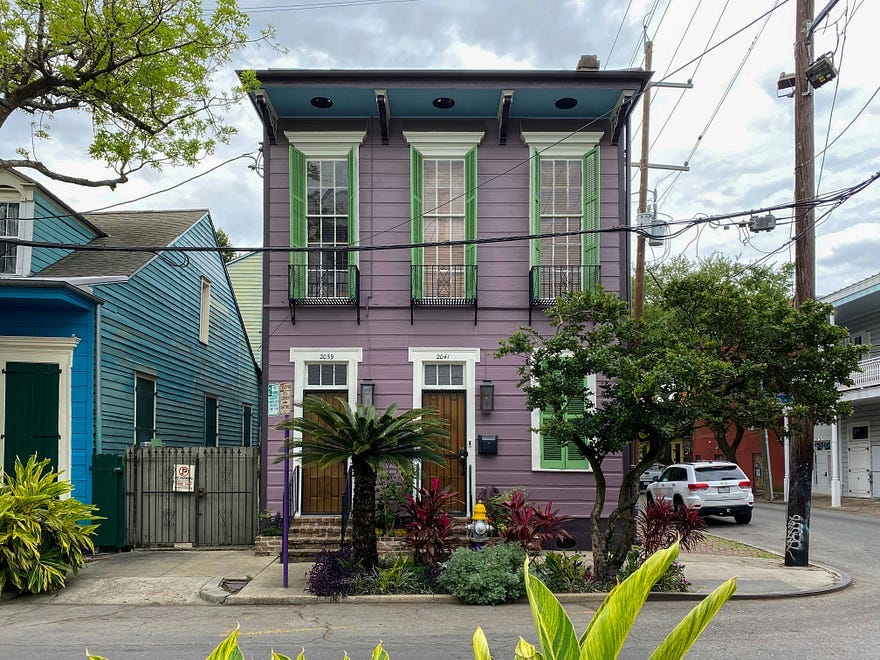A New Orleanian Mishap
That time I accidentally helped the fortunate become more fortunate

In 2015, I signed up for a volunteer program in New Orleans. I was to live in the heart of the lower 9th ward, one of the areas most severely battered by Hurricane Katrina a decade prior. As I put my name on the list, there was a certain image I had in mind of the weeks ahead.
I pictured myself in worker’s clothes, with a hammer in one hand and a nail in the other. I envisioned myself building up a home’s foundation scrap by scrap, board by board.
Arriving at my hostel, I didn’t know quite what to expect. Walking past the fridge revealed a vent that smelled faintly of animal decay, a log detailing our changing shifts, and a cozy little corner of the room occupied by chatting Brits. We exchanged nods, names, and pleasantries before I walked my jet-lagged legs to my room and dropped my luggage on the floor.
Pushing my bags underneath my bunk revealed a bed stiffer than the hostel’s creakiest floorboard and more beaten down than the greasiest of po’boys. But we were there to help the less fortunate, so sleeping in an echo chamber of snores on a mattress made of cement was a blow I’d simply need to bear.
The following morning, we woke to the abrasive din of roosters and shoveled down the city’s least appealing breakfast before filing into a beaten-up van. The doors were mismatched and hung lopsidedly from their hinges.
It was driven by a man whose eyes were slightly askew. He talked with the adamance of a military commander, and the coherence of a meth-addled Mardi Gras goer.
The car smelled like a concoction of gasoline, vinegar, and old electronics. It seemed to permeate the fabric of each soot-stained seat and seeped into the miscellany-scattered floor beneath our feet.
We prepared to get our hands dirty as my eyes fixated on a stain of grease oddly reminiscent of the great Mona Lisa. With each bump, we heard the clatter of heavy machinery that had been loaded haphazardly into the trunk.
On many of the lots we drove past were the tattered remnants of what were once houses. Some of the lots had been cleared entirely. There were one-story homes that had taken beatings and sheds standing on their final legs. I expected we’d be parking any moment.
A few bumps and creative Rorschach greaseblot interpretations later, we arrived. And where we arrived was enough for me to practically perform a double-take.
Where the van had stopped was the decidedly most established corner in all of the lower 9th ward. Walking up the stairs of the 4 story home, there was an exchange of confused glances between the week’s new volunteers and I. We were given tools, assignments, and promptly got to work. My first few hours were spent with eyebrows arched in confusion.
Instead of repairing broken-down homes or erecting foundations from the ground up, my entire time in the oceanside town was confined to handiwork in the most affluent house on the entire block. And with each menial task in their opulent living room, I looked toward the flat screen a few years newer than the one I had at home and wondered what I was doing there.
I can’t say the experience was all bad, though. My time free from fancying up the already-bougie home granted ample opportunity to explore the city. Not to mention, I had the chance to slink away from my work post every couple of hours during my shifts and tend to my newly acquainted canine friend. He came with the house, and he was a blameless victim in our misallocation of effort. Sensing a dog in need, I had no choice but to act.
While my time in New Orleans wasn’t the character-building endeavor I’d hoped, it proved an opportune couple of weeks to listen to Tame Impala on the colorful streets of the cultural melting pot of a town. And my Siberian jail cell-themed mattress granted me a delightful opportunity to spend the fall after high school thinking a little too hard about life.
After a few weeks of social floundering and feeling simultaneously exhausted and useless, I returned home a few shades more cynical. If I was going to discover an outlet for my philanthropy, it was unlikely to be found in the most garish homes of The Big Easy city.



That’s why Jimmy Carter’s work is so meaningful.